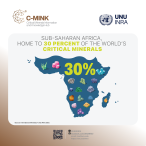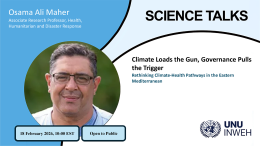After winning a sum of $7400 each in December 2024, 10 young INFoCAT Innovation Challenge winners are going through a series of activities with the INFoCAT (Ghana) team and experts in the agriculture and renewable energy sector, with the aim of finetuning their innovations and adapting their agritech innovations, to best suit the needs of the smallholder farming communities, visited at the inception stage of the INFoCAT project.
From 22nd - 24th January, the INFoCAT (Ghana) team visited smallholder farming communities across 3 regions in Ghana: Central, Eastern and Volta to understand the pertinent agritech needs of these farmers and agro-processors.
Each community engagement involved introduction of innovators and their innovations to the farming communities. The farming communities also pointed out the challenges they faced in their farming processes. This was to help the INFoCAT Ghana team identify with experts, how to help the innovators adapt their agritech innovations, to help with efficiency, high costs associated with renting and buying agritech machinery and most especially, to help reduce drudgery in farming activities.
Gomoa East district -Kweikrom- (Groundnut farming community)
The first stop was the Gomoa East district- Kweikrom, a groundnut farming community, where farmers pointed out issues around lack and high cost of agritech machines especially tractors, issues with irrigation and difficulties in getting agricultural inputs such as chemicals and seedlings. They also pointed out ploughing as a major concern as well as the drudgery, long hours and days required to pluck and sort groundnuts after harvesting.
In response, experts had a detailed information gathering session with farmers on what their desired agritech machines should do. This is an initial co-design process to incorporate users’ inputs in the design of the agritech solutions for easy adoption. A prototype design was agreed on that will pluck and sort out groundnut into various sizes within an hour, saving them time and allowing for less labourers when grading the nuts.
Gomoa Mampong - (Rice farming)
At Gomoa Mampong, the rice farmers pointed out the high cost of hiring a diesel -powered mini combine harvester and difficulties in accessing this harvester during peak rice production seasons, since it is the only one available to the farming community. They also pointed out irrigation as a major challenge.
Battor,Volta Region,(Pepper farming and rice farming)
In this district, some farmers mentioned that, the rice is harvested manually (normally labor intensive) or by hiring of a mini-harvester. They highlighted that pre-cleaning (sorting debris from the paddy) is usually time consuming and tedious.
Here, the experts proposed a mobile machine for pre-cleaning and winnowing(blowing air through grain in order to remove the chaff). This technology is to separate grains faster and reduce losses.
Pepper farmers in this community, depend on the sun for drying their harvest. They pointed out the delays and loss in quality and quantity of pepper during wet seasons. This community lacks a dryer and finds it difficult to get a well functioning dryer. A quick solar dryer with a heater and blower system was proposed to be designed for piloting.
Yilo Krobo District- Abrewankor and Sojonu- (Cassava processing)
Farmers in this community pointed out peeling of cassava as their major problem especially in the dry season. They added that it takes (3 people) 7 hours to peel 12 bags of cassava. Issues around cassava waste treatment, grating, and roasting were also identified as challenges. Here, the INFoCAT team proposed an integrated cassava processing system. This processor will include: a solar powered cassava peeling machine that peels the cassava, treats the cassava waste in a portable biodigester system to produce methane (CH4) gas (biogas). The gas produced will then be used in a biogas stove for roasting gari (cassava flakes) or used to power a grating machine.
An improved clean cookstove was also proposed to be designed for roasting the gari. This integrated cassava processing unit powered by clean energy can serve a small local factory, to empower women's groups in these communities who have several economic activities around cassava.
Next phase of project
- Continuous provision of green design mentorship for green entrepreneurs
- Design and fabrication of clean agritech prototypes for piloting
- Piloting of technologies in communities
- Appraisal of technologies to ascertain their efficiency in the field(farming communities).
- Selection of best technologies for grant funding to upscale
- Training of 30 young women in green design and fabrication
- Policy influencing and technology promotions
The INFoCAT project is to advance economic empowerment of both women and youth in rural areas of Ghana , Cote D’ivoire and Senegal, by promoting low-cost clean energy-powered technology solutions that increase agricultural productivity and income for smallholder rural farmers.
INFoCAT is sponsored by International Development Research Center(IDRC), Canada. Project partners also include : ENDA Energie(Senegal) and Cote D’Ivoire ( UNU-INRA , operating Unit).




